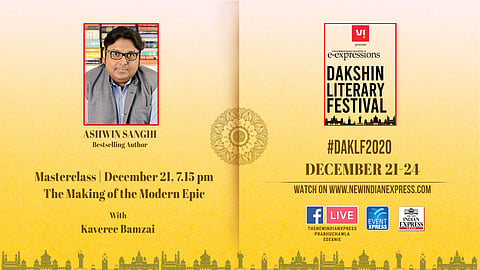

When you write books that are based on research then it's probable that somewhere along the way you are picking up information that is out there, says bestselling author Ashwin Sanghi talking about how sometimes even in fictional books there are incidents or instances that feel eerily similar to real-life events. "I saw that happening when I wrote The Rozabal Line, I predicted, part of my story was an attack happening in Mumbai with a bunch of Pakistani terrorists arriving on a boat and landing on the shores of Mumbai. That was kind of eerie. It was something that I never wanted to predict in my wildest dreams," he added.
While speaking about his new book The Vault of Vishnu at Dakshin Literary Festival 2020, Ashwin said, "I was thinking to myself — we are living in a world of bioengineering and Artificial Intelligence and therefore doesn't it seem practical that superpowers would want to be engineering super soldiers of some sort. For me, it sort of tied into the theme of the fact that you had a martial art linkage between India and China, possibly there could have been an ancient potion which has a link to the modern bioengineering of these particular creatures. It fit in beautifully into my story. I never set out to make a prediction, there wasn't an effort in that regard and then suddenly on Twitter and Facebook people began sending me messages saying, 'Do you realise that now fiction seems to be playing out as fact? Where you have shown to be superhumans at the Indo-China border now there are news reports that the Chinese are actually sending their army.' For a minute I was like, 'Oh my god'. I have always maintained that fact is stranger than fiction and I am not surprised."
Responding to senior journalist and author Kaveere Bamzai about his 'myth and history makes mystery' formula, the author added, "What is so fascinating and great about India is that we just have so many streams of thought. Dharmic thought is essentially very plural, it embraces multiple truths. You can be an astik, nastik, vegetarian, carnivore, idol worshipper, fire worshipper, you could be anything. We can have 300 versions of the Ramayana and all those could be right. Religions in that sense are a path to the divine and that is what makes us. Today's generation is not exploring that stuff. I take some of these elements which are based on existing texts, work, ideas and then I try and build a fictional story around it. That's where I am coming from. For us, the delicious question is always 'what if'. For me, the favourite definition of a myth is a lie that couches a truth. You know that it is fantastical, it's unbelievable, but there is a core truth that it is trying to reveal itself to you. In that sense, myth is far more true than history."
Emphasising more on how history has different versions and people should read all the versions, the author shared, "We should not restrict the version of events but to allow multiple versions to exist. I will generally have a viewpoint but will read all the alternative viewpoints. Even when we are teaching history to students in this country let's give them the option to choose what they want to believe as history is multi-dimensional. It's not 'what you see is what you get'."
During the conversation, he also adds that he is writing a web-series. "If you are a storyteller, movie, games, novella, web-series — ultimately they are all telling a story. I would like to try my hands at being able to tell stories in different formats. Adapting books into movies is one part of it, but why not try to develop stories where you have original ideas where they're ideally suited to the screen first. If we were students at a time when these mediums were around rather than reading boring history books, we would have realised history is ultimately a story," laughed Ashwin.
Finally, speaking about the pandemic and how it changed our lives, he says that stories will emerge from relative isolation, which people have experienced for a large part of this year. "They should reevaluate what is really important to them. I had a lot of time to do that for myself. Even getting vaccines and making them accessible is going to be a long trek. We are in for a long haul. I believe 2021 will also be a struggle," he concluded.
